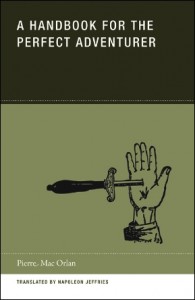A Handbook for the Perfect Adventurer by Pierre Mac Orlan
 A Handbook for the Perfect Adventurer
A Handbook for the Perfect Adventurer
by Pierre Mac Orlan
Trans. by Napoleon Jeffries
Wakefield Press, October 2013
104 pages / $12.95 Buy from Wakefield Press or Amazon
It’s easy to be intimidated by a dude who has written upwards of 130 books, not counting flagellation erotica. But then you take a look at the sketch of him on A Handbook’s first page, labeled “Private First Class Pierre Mac Orlan, Military Cross,” and (if you are like me) immediately relax:

That’s the story of reading A Handbook for the Perfect Adventurer. Peppered with (actual, academic) footnotes, headed by chapter titles like “The Various Categories of Adventurers” and “On the Role of the Imagination,” you get the sense starting out that you’re delving into some serious study of the adventurer’s role in early 20th century French literature.
Part of this weird effect comes from what Wakefield Press does with the book. Design is stark, almost academic—but handbooky, too, with that authoritative streak the pocket-guide folks always mean to bestow. The 13-page introduction (and this is for just over 50 pages of content) has actual history in it, from a brief discourse on the French novel at that time to a contextualization of the book within the aftermath of World War I. Even the translator’s remarks on A Handbook’s inherent, decontextualized value is a sober meditation on its potential synecdochic value with relation to the history of adventure at large.
But once we get into the text, the book turns out to be pretty fucking hilarious. Mac Orlan keeps you on the rocks for a while, taking pains to distinguish the “active” from the “passive” adventurer, the cavorting blockhead from the armchair fiend of imagination. It’s still possible, in these early sections, that he’s entirely serious about the theoretical structure he’s setting out. Until we start getting stuff like the list that accompanies an account of the Active Adventurer’s troubling youth:
The Sad Setting Adopted by the Young Adventurer
The frog inflated by a simple straw.
Goldfish swimming at the surface with the help of corks pinned to their backs.
June bugs pulling a tiny scrap of newspaper through the air from their backside.
The fly without wings.
The ridiculed dog.
It goes on. Details like this end up being a serious redeeming factor of A Handbook for the Perfect Adventurer. There’s something about their oddball quality that tingles for having crossed the century in the way it has: slowly, as only three of Mac Orlan’s books had been translated into English before this one. It feels good that there were folks in 1920, too, who prioritized being funny and a pain in the ass, leaving more “serious” tomes to the hand-wringers.
Though with the tongue-in-cheek mode, as we know, a whole lot that is of interest can be conveyed anyway. There is certainly something being said about the dreamer here, when Mac Orlan outlines the strict “exercise” regimen the Passive Adventurer must undertake:
If one considers Passive Adventure as an art, some natural gifts have to be allowed for in future initiates. These gifts must be practiced and perfected. It is a question of intellectual gymnastics that include daily exercises and in particular the methodical training of the imagination.
The cool thing here is that he’s not affecting a take-down of anyone in particular. Sure, he’s giving a reasonable amount of hell to the person whose pulse begins to race at the words on a page that represent a steaming sea battle, or a life-altering meeting with the natives of a remote island. But this is more of a poke at the idea of adventure at large. (Ah, Napoleon…the introduction was right!)
While Napoleon Jeffries’ portion of the book remains fairly staid, aiding Mac Orlan’s straight face, even he occasionally jumps in on the fun in the text of a footnote. Eye the prioritizing of information in this one, one of many clarifications of Mac Orlan’s name dropping in the text:
26…Adolphe Thiers (1797-1877) was a politician, historian, and in Karl Marx’s words, a “monstrous gnome”; his best known work is the multivolume History of the French Revolution.
By the end of A Handbook, we’re digging it. Under the heading “Benefits an Adventurer Can Gain from Traveling,” Mac Orlan has included:
Seasickness.
The adventurer is exploited like a milch cow.
The adventurer is too hot.
Tortures pertaining to entomology.
Boredom.
Disgust.
The self-same chapter ends, totally inexplicably, with the single paragraph:
November 15th, 2013 / 11:00 am
